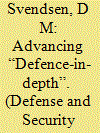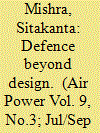| Srl | Item |
| 1 |
ID:
137939


|
|
|
|
|
| Summary/Abstract |
This article aims to encourage the fostering of more systems thinking, and its greater exploitation, within the domain of contemporary intelligence. With particular focus on “micro systems thinking” and with reference to key intelligence processes, such as intelligence analysis, the utility of many systems dynamics within the intelligence context seeks to be further revealed. Through their greater collective harnessing, including up to “System of Systems” (“SoS”) dynamics, and promoting all that they can offer, more sophisticated overarching operational-to-strategic/policy “ends,” notably that of “defence-indepth,” can be viably further advanced in a sustainable manner into the future. Arguably, a much-needed transformative impact on contemporary intelligence can also be increasingly realised through comprehensively engaging in and with more systems and SoS thinking. Aiding civil protection tasks, crisis management, emergency planners, and civil contingency practitioners likewise gain.
|
|
|
|
|
|
|
|
|
|
|
|
|
|
|
|
| 2 |
ID:
137827


|
|
|
|
|
| Summary/Abstract |
The realm of ‘nuclear technology’ is amongst the most beguiling subjects of the human civilisation for the fact that words like ‘atom’ and ‘radiation’ have engendered both lasting fear as well as abounding hope in many. However, what is less certain is why it has entrenched such strong group (pro- and anti-nuclear) alignments. Fingers point towards the ‘risk’ associated with nuclear technology; but risk perception is a “combination of facts and fears, intellect and instinct, reason and gut reaction”; it is a ‘subjective’, not a purely rational and fact-based process. Therefore, any hasty response to a perceived risk may pose a danger by itself. Moreover, risk is calculated by multiplying the probability of the consequence by the severity of the consequence. On the other hand, the unrealised lofty goal of abundant energy through the nuclear route and a few nuclear disasters have given rise to public scepticism.
|
|
|
|
|
|
|
|
|
|
|
|
|
|
|
|